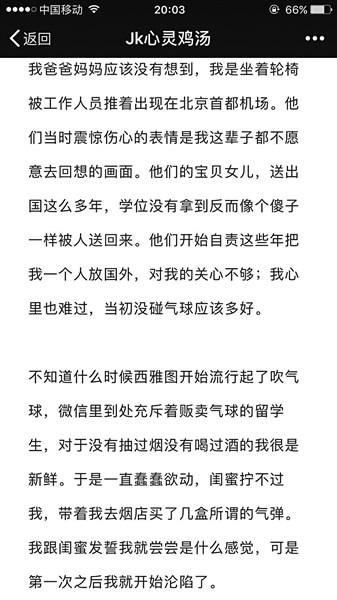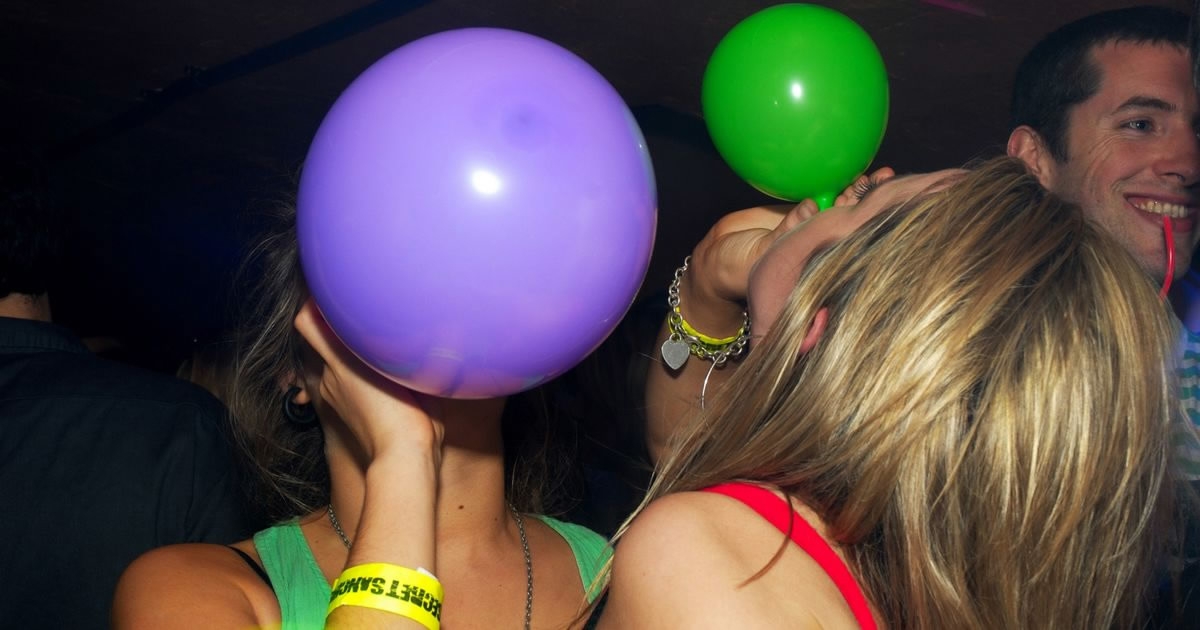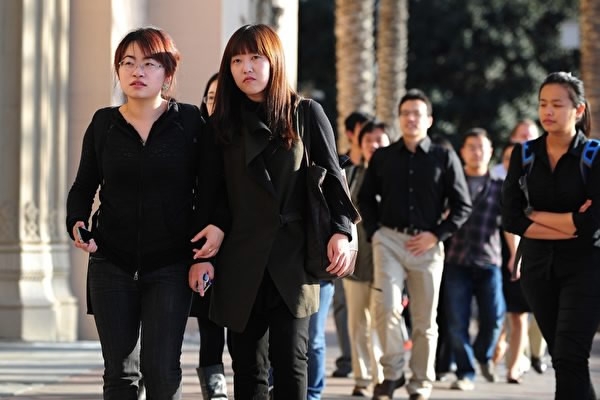“Today’s Christmas Eve, the outside world is bustling. Then I saw the piss and shit all over my bed, I realized I’ve got problems with incontinence. The air is now filled with the rotten smell of food mixed with a stench,” Lin Na wrote in her diary.
Lin is the girl who caught the widespread attention of Chinese netizens after publishing her abuse experience with nitrous oxide in Seattle which eventually deprived her of the ability to walk.

Screenshot of Lin Na's diary.
It started off from pure curiosity caused by the buzz amongst Chinese students in America on WeChat, a popular Chinese social network.
Lin decided to give it a try. After all, nitrous oxide was easily available at any corner tobacco stores. The gas-inhaling experience was typical weekend fun for well-heeled young students just like her.
The “high” that ensued was an intense feeling of euphoria she’d never had before. Lin was immediately enchanted by the gas, without realizing the cheap pleasure would soon turn into a nightmarish addiction.
After days of heavy abuse, she began to suffer from insomnia and an increased heart rate, but that didn’t hold her back from seeking the intoxicating rush.
The addiction then completely enslaved her. Lin stopped going outdoors and instead lived amongst piles of gas canisters. She was light-headed all day long and her fingers and feet went numb, to the extent she couldn’t even hold a glass.

Photo provided by Lin Na.
Hallucination swallowed her. Lin became suspicious and scared of the world. She was afraid of being hit by cars, or eaten up by her dog, or even poisoned to death from drinking water.
Indications of her decaying health were alarming: Red patches appeared on her body, and the skin on her hands were peeling, but she paid no attention. “I looked at the body that didn’t seem to belong to me with apathy, as if it wasn't important at all,” Lin’s diary read.
Worried friends persuaded her to go outdoors for a while, but it wasn't long before she fell at her feet and realized she couldn't walk. In the following days, Lin started to lead a life “like an animal”. She wrote, “I crawled to the toilet and crawled to get my takeout, I know I’m destitute of dignity.”
A visiting friend was astonished to find her living in her dump-like bedroom. She was then taken away by an ambulance, with feces and urine all over her clothes.
Lin was finally sent back home, in wheels, met by her heart-struck parents at the airport, who blamed themselves for neglecting their daughter who was living overseas for years.
“I'm also sad. How I wish I had never touched the balloons (of gas),” Lin said.
Lin’s diary was an instant hit, garnering over 100,000 clicks within 24 hours after it was posted on Wechat. Her story shed light on a new popular “legal” drug with ignored lethal risks that has secretly gone viral among young teenagers in Western countries, and also eventually Chinese students studying abroad.

Sina Weibo Photo.
Nitrous oxide, otherwise known as laughing gas, is more commonly known as “hippy crack”. It’s the second most popular recreational drug after cannabis among party goers. The drug is usually used as an anesthetic and painkiller to reduce patients’ anxiety at the dentist’s office, but it is also sold in small cartridges that are intended for use in making whipped cream, which are widely available on the internet, as well as on the street.
Long-term and heavy-use of nitrous oxide is highly detrimental. It can lead to vitamin deficiency and anaemia as a result of the inactivation of vitamin B12 in the body, which may cause serious and irreversible nerve damage, affect the spinal cord, and cause numbness and pains in the fingers and feet and other affected areas. In worse cases like Lin’s, one could lose the ability to walk.

Sina Weibo Photo.
Lin’s story also brought the issue of underage Chinese students studying abroad to public view once again.
Lin, who has been studying in the US for 10 years since secondary school, belongs to a growing population of Chinese teens who head overseas without their parents to continue their education. In the US, the population of Chinese students enrolled in American high schools approached 40,000 in 2014, a 60-fold increase compared to 2005, which was 641, according to the US Institute of International Education.

Sina Weibo Photo.
The kids, often called "parachute kids", however face the risks of a hard landing. While some flourish and move on to excel in their respective colleges and jobs, others struggle to fit in and go down a bumpier road. Behavior problems with the kids free from parental restraints have become an increasingly severe cause of concern for both parents and educators, in light of the recent headlines of violent bullying incidents and cheating scandals, or shocking self-indulging cases such as Lin’s.
Lin is grateful that her loving parents are now at her side, encouraging her all the way to her recovery.
“Lying in the hospital, I realized I’m still young…there are so many things on my bucket list awaiting me,” Lin wrote at the end of her diary, “I wish there's still time to finish them all.”









